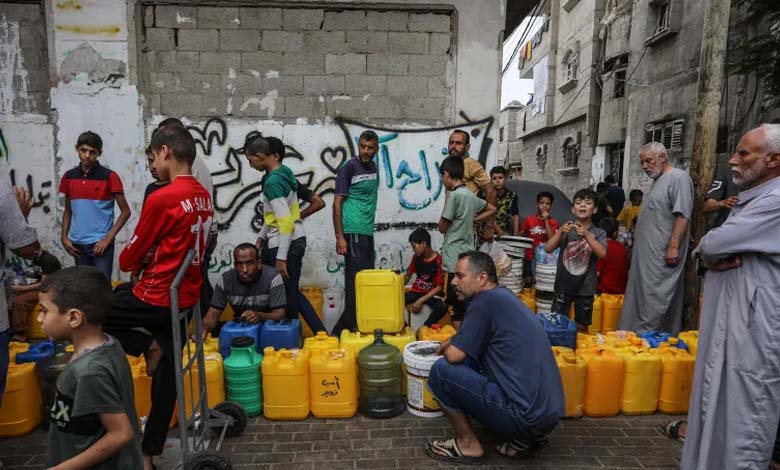Thirst crisis worsens: Water in Deir al-Balah more precious than gold

In a desperate cry reflecting their dire need, Deir al-Balah stands as a witness to a worsening water crisis. Residents are pleading as water supplies dwindle, telling a harsh tale of continuous struggle for survival. In the heart of Gaza, the city of Deir al-Balah fights to quench its thirst, facing an unprecedented water crisis.
The number of displaced people has doubled, and repeated Israeli bombings of water resources have led to a severe shortage of potable water and water for other uses. This report sheds light on the dire water situation in the central governorate, offering firsthand accounts of the residents’ struggles and the daily challenges they face to secure water, the essential resource for life.
Water Crisis
Deir al-Balah, located in the central governorate of Gaza, is suffering from severe drought and an acute water shortage. This situation has dramatically worsened due to the massive increase in displaced people and repeated bombings of water infrastructure by Israeli forces. Local reports indicate that the current water crisis, in both its humanitarian and logistical aspects, is a direct result of these tragic events.
Iyad al-Maghari, the mayor of Nuseirat, confirms that the governorate is experiencing an unprecedented water crisis. Israeli planes have bombed well stations, leading to the shutdown of many due to the lack of necessary fuel for their operation.
Al-Maghari adds that the bombing of primary water sources and the displacement of around half a million citizens to the governorate, especially after the announcement of a military operation in Rafah, were key reasons for the water shortage.
Residents now have to walk long distances to fetch water, whether for drinking or other uses, at prices far exceeding the original cost.
The mayor points out that specialized technical teams for water provision are under immense pressure due to the lack of available resources and capabilities, which contrasts sharply with the growing demand and dire needs of the citizens.
-
Resumption of Truce Negotiations: New American Efforts with Egypt and Qatar to Stop the Gaza War
-
Gaza destruction compared to Ukraine’s
A water distribution schedule has been organized, where the municipality provides a water line to each area once a week for a few hours only, which is insufficient to meet the basic needs of the residents.
Al-Maghari notes that Israeli bombings have damaged several water stations, including desalination plants, destroying them completely in a clear attempt to deprive Gaza residents of their basic right to access water.
-
Israel Declares War in Gaza Until at Least the End of 2024
-
Washington excludes Israel’s commission of genocide in Gaza
Price Doubling
The private sector is also suffering from the choking water crisis. Khaled Ismail, who works in distributing and selling drinking water, says he can no longer provide water to residents as he did before the Israeli war. Ismail states that he used to sell 10 truckloads daily before the war, but now struggles to provide just two.
He adds that water scarcity in the governorate has decreased to 30% of what it was before the war, while demand has increased more than tenfold due to the new influx of displaced people.
Ismail concludes by mentioning that the price of non-potable water has increased fivefold, adding pressure on water distributors and residents who were accustomed to specific prices.
Previously, water was sourced from several stations, but now only two stations are operational in the entire governorate, both under immense pressure due to the high number of trucks.
-
Gaza Attends “Justice”… Learn About the Story of “Peace Palace”
-
“I Feel Ashamed”… First Resignation in the U.S. Army Due to Gaza War
Used to Scarcity of Medicine and Food
Amid these harsh conditions, stories of resilience and challenge emerge. The people of Deir al-Balah talk about their daily struggle to secure water, showing an unyielding strength in facing this crisis. Children, women, and the elderly all participate in the search for water, bearing the burden of walking long distances under the scorching sun.
Mohammed Abu Marai, one of the displaced, says he walks more than ten kilometers daily in search of a few liters of water just enough for his children and their mother to drink, adding that he doesn’t talk about the importance of medicine or food because they have grown accustomed to this harsh life for over eight months.
-
“Support for Gaza”: The Houthis’ Pretext for Turning Sanaa Mosques into Recruitment and Mobilization Centers
-
Ismail Haniyeh Renews His Rejection of Excluding Hamas from Any Settlement Regardent Gaza’s Future
Abu Marai adds that since the beginning of the Israeli aggression, they have known well that food is not available daily and their bodies have adapted to that, stating that his children might eat once every two days, but water is a completely different matter. If he does not provide water for even one day, the children quickly deteriorate.
Local Initiatives Are Not Enough
Under the weight of the crisis, community efforts unite to ease the burden on residents. Omar Yassin says that local initiatives always emerge here and there, with neighbors sharing water and distributing it to the most needy families. Sometimes, families pool resources to buy small generators to help pump water from the few operational wells.
-
Final Warning to Netanyahu: War Government Turns Against the Prime Minister Over Gaza
-
Latest Developments in the Gaza War: Israel Ignores Warnings and Prepares for a Larger Incursion in Rafah
Yassin adds that despite these efforts, there remains a dire need for international intervention and humanitarian support to save the water situation in Deir al-Balah. He mentions that humanitarian organizations and charitable associations are working tirelessly to provide water to residents, but that the need far exceeds the available resources.
An urgent call is made to the international community to intervene and provide the necessary support to rebuild water infrastructure and provide clean, safe water sources for Gaza’s residents.












